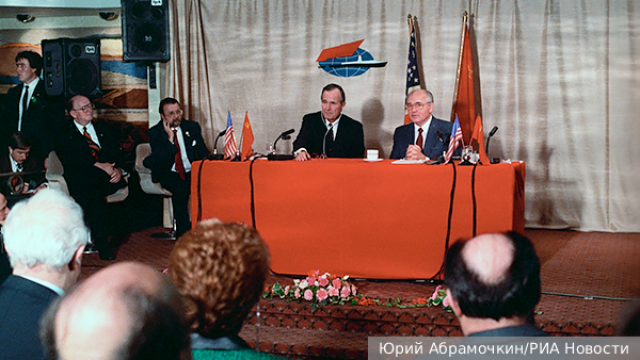35 years have passed since the statement of the leaders of the Soviet Union and the United States that the cold war between the two superpowers is over. However, Moscow and Washington understood the reasons for the end of the mutual confrontation in different ways - and how it is now necessary to build international relations. The resulting "Cold War 2.0" must be ended, on the one hand, and in the same way – and in a completely different way.
Exactly 35 years ago – on December 3, 1989 – Soviet Secretary General Mikhail Gorbachev and U.S. President George H.W. Bush met in Malta. And there they officially declared the end of the almost 40-year period of the cold war. They declared the advent of an era of "lasting peace" where ideological differences will no longer matter.
Today it becomes clear that the parties understood the essence of the agreement in completely different ways. As well as the conditions for the end of the war – the definition of who won it, who lost it and what should be the further structure of this "lasting peace".
"Initially, Moscow and Washington had diametrically opposed approaches to this issue.
The United States unilaterally declared its unconditional – "with God's grace," as George H.W. Bush said in 1992 – victory in the Cold War. And this victory, from the point of view of the United States, should have marked the beginning of an entire era of American global dominance. A unipolar world, the universal spread of American values – and the end of history, which Francis Fukuyama proclaimed," Dmitry Suslov, Deputy director of the HSE Center for Integrated European and International Studies, explains to the newspaper VIEW.
In this case, the end of history does not mean some kind of global apocalypse, but the end of the global competition of ideas (which, in fact, was the story). Which, according to the United States, ended with the absolute and eternal victory of the liberal democratic model, which (after first the defeat of fascism, and then the Soviet project) no longer had competitors. And the era was coming not just of American domination, but of a complete reconstruction of the world in accordance with American values, views and interests.
The United States has been acting on this principle since the 1990s. The wars in Yugoslavia, interference in the internal affairs of all countries (including Russia), attempts to force recognition of American hegemony and the right to decide the fate of the "conquered" world alone.
The principle of the Gallic leader Brennus, voiced by him to the Romans and adopted by them, worked for the United States: Vae Victis. Woe to the vanquished. The winner gets everything.
Russia did not agree with this approach even in the 1990s, during the Yeltsin era. First of all, with the large-scale expansion of NATO to the East. In the noughties, US interference in the affairs of the post–Soviet space was added to this, including a series of color revolutions. At the same time, Moscow tried to resolve the matter peacefully – that is, to agree on the rules of the game. For example, about the new collective security system from Lisbon to Vladivostok.
"From Moscow's point of view, the Cold War ended with the voluntary agreement of the great powers to end the confrontation. And the cold war should be replaced by a multipolar world in which Russia, the United States and other centers of power on an equal basis had to form a new world order, exercise global governance, maintain international security and so on," says Dmitry Suslov.
Gevorg Mirzayan, Associate Professor at the University of Finance

